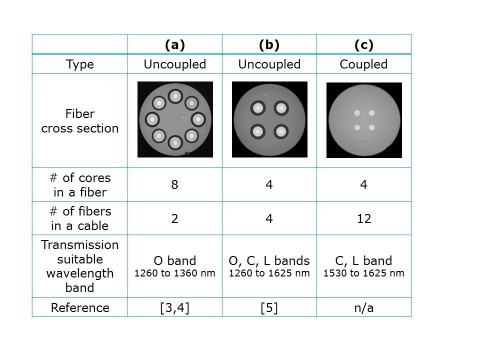The University of L’Aquila, Sumitomo Electric Industries, Ltd.
(TOKYO:5802)(ISIN:JP3407400005) and Optoscribe Ltd. have jointly
deployed the world’s first testbed for multi-core fiber communications
in a field deployed environment in the city of L’Aquila, in Italy.
This press release features multimedia. View the full release here:
https://www.businesswire.com/news/home/20190605006033/en/

Table 1: MCFs installed in the testbed (Graphic: Business Wire)
The University of L’Aquila, Sumitomo Electric, and Optoscribe have
jointly deployed the world’s first multi-core fiber (MCF) testbed for
space-division multiplexed*1 (SDM) fiber-optic communications
in a real-field environment in the city of L’Aquila, as part of INCIPICT
project.[1,2] An MCF is an optical fiber with multiple cores
in a glass cladding and is considered one of the most promising SDM
transmission technologies to overcome the limitations of conventional
single-core fiber communication systems. For INCIPICT, Sumitomo Electric
fabricated two types*2 [3–5] of uncoupled MCFs and one type*3
of coupled MCFs with a standard glass diameter of 125 µm*4
(details in Table 1). The standard glass diameter enabled the use of
conventional optical fiber cable and connector technologies. The MCFs
were cabled into conventional loose-tube jelly-filled cables (Fig. 1)
widely used in Europe. Optoscribe manufactured fan-in/fan-out (FIFO)
devices*5 3D OptoFanTM[6] for the conversion
between MCFs and multiple standard single-mode fibers (SMFs). The MCF
cable was installed in a microduct placed on INCIPICT’s rack in the
walkable multi-service underground tunnel sketched in Fig. 1. Figure 2
shows the experimental fiber-optic network of INCIPICT, in the city of
L’Aquila. The MCF testbed was installed as a part of it. The total
length of the installed MCF cable is 6.3 km, of which 5.6 km in the
tunnel and 0.7 km in the laboratory that gives access to the fibers. The
optical properties of the MCFs were evaluated before and after the
installation, and no significant degradations due to the installation
were observed.
[Future prospect]
The MCF testbed will be used to host various R&D activities in fiber
optic communications, and specifically in the area of SDM transmission
over MCFs. These include device testing, transmissions and
software-defined networking, also in conjunction with the ongoing 5G
trial (L’Aquila is one of the five Italian sites selected for trialing
5G technologies). The testbed will serve to assess problems and
requirements for deployed MCFs, thereby contributing to the development
of SDM transmission systems. The testbed will be available to the
international research community under the jurisdiction of the
University of L’Aquila.
[Acknowledgements]
The MCFs fabricated by Sumitomo Electric for INCIPICT was cabled by
Opticable S.A., a joint venture of Nexans S.A. and Sumitomo Electric, in
Belgium.
[About the city of L’Aquila, and INCIPICT Project]
The city of L’Aquila, the regional capital of Abruzzo, is located in
central Italy. The city was struck by a high-magnitude earthquake on
April 6, 2009, which destroyed most of the city center. Since the
beginning of the reconstruction process, the city has been open to
various experimental projects based on a green-field approach, to which
a fraction of the reconstruction funds has been dedicated. One of these
projects is INCIPICT (Innovating City Planning through Information and
Communications Technologies), proposed and led by the University of
L’Aquila and funded by the Italian Government, in the spirit of
supporting production and research activities in L’Aquila. Inspired by
the concept of a living-lab, this project includes various research
activities that ultimately rely on the fiber-optic infrastructure.
Details can be found in [1,2].
*1 Space-division multiplexed transmission
A transmission method
for multiplexing signals using multiple spatial channels in optical
fiber. Various fiber structures have been proposed to this end,
including MCFs, where the fiber cores are used as spatial channels, and
few mode fibers, where the fiber modes are used as spatial channels.
*2 Uncoupled multi-core fiber
An MCF designed so as to suppress
crosstalk (XT) between cores, so that an MCF with N cores is
equivalent to N isolated single-core fibers with higher spatial
density of cores.
*3 Coupled multi-core fiber
An MCF with smaller core-to-core pitch
than uncoupled MCFs, intentionally designed to have random coupling
between cores. Although multiple-input-multiple-output (MIMO) digital
signal processing is necessary for extracting the signals transmitted in
the various cores, random coupling reduces the accumulation of nonlinear
propagation effects and modal dispersion (which has a considerable
impact on the MIMO complexity). These advantages are significant in
long-haul point-to-point links, such as submarine transmission systems.
*4 Standard glass diameter
The cladding diameter of a fiber is
defined to be 125 ± 0.7 µm and the coating diameter to be 235-265 µm by
international standards.
*5 Fan-in/fan-out device
A device that connects individual
conventional SMFs to the cores of an MCF.
[References]
[1] http://incipict.univaq.it
[2]
C. Antonelli et al., “The City of L’Aquila as a Living Lab: the INCIPICT
Project and the 5G Trial,” in 2018 IEEE 5G World Forum (5GWF), 2018, pp.
410–415.
[3] T. Hayashi et al., in Opt. Fiber Commun. Conf. (OFC),
Los Angeles, 2015, paper Th5C.6.
[4] T. Hayashi et al., in Int.
Wire Cable Symp. (IWCS), Providence, 2018, paper P-6.
[5] T. Matsui
et al., in Eur. Conf. Opt. Commun. (ECOC), Valencia, 2015, paper
We.1.4.5.
[6] http://www.optoscribe.com/products/fiber-to-fiber-interconnects/
View source version on businesswire.com: https://www.businesswire.com/news/home/20190605006033/en/